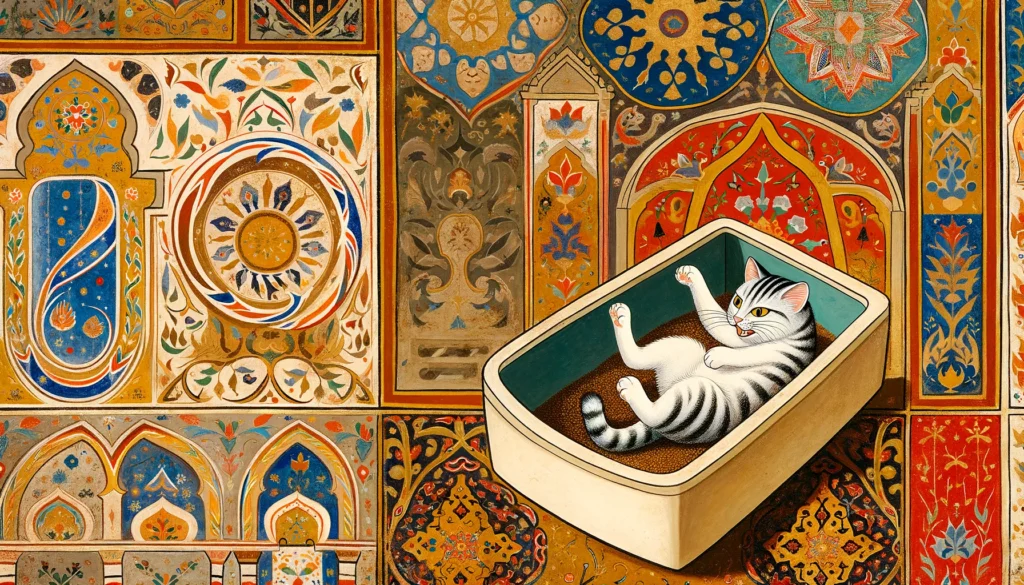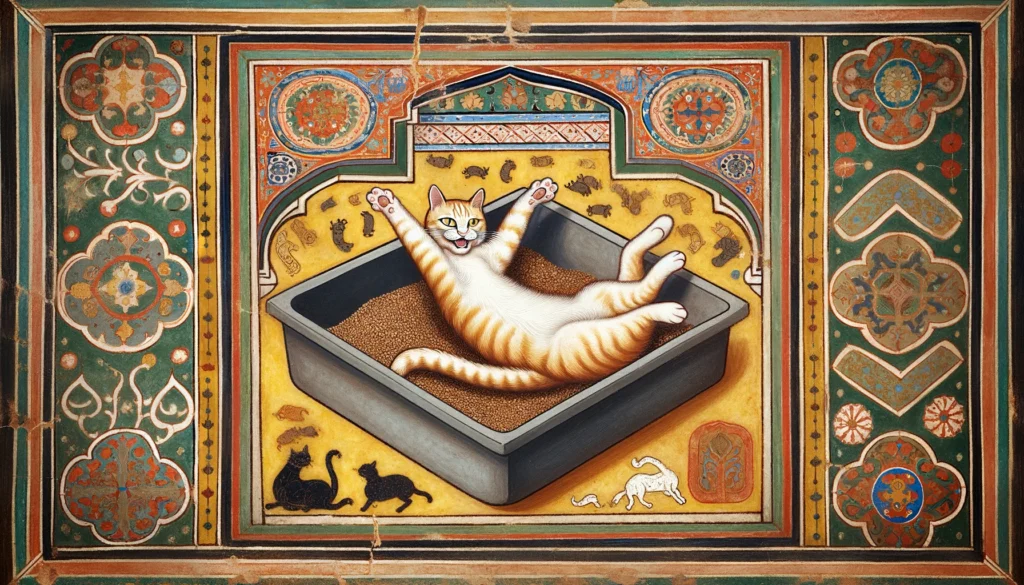Many cat owners wonder why cats roll in litter. Is it a quirky hobby? or is there more to it? In this article, we’ll dive into this common yet puzzling behavior of felines. Stay tuned for a fascinating journey into feline psychology and hygiene habits.
Key Takeaways: Understanding Your Cat’s Litter Behavior
- Cats’ Behavior: Rolling in litter is often linked to natural instincts like territory marking or seeking comfort.
- Health Indicators: Changes in this behavior can highlight potential health issues or stress in your feline friend.
- Litter Preferences: The type of litter and the cleanliness of the box play significant roles in your cat’s litter habits.
- Observation is Key: Regularly observing your cat’s behavior and maintaining a clean litter environment can prevent problems.
Is your kitty making a mess? Check out Why Does My Cat Kick Litter Everywhere?: Solving the Mystery
Unraveling the Mystery: Why Do Cats Roll in Litter?
Cats roll in litter for various reasons that reflect their natural instincts and environmental responses. Let’s dive in and scratch the surface of this curious behavior!
Exploring Behavioral Instincts of Cats
Behavioral instincts of cats drive many of their actions, including rolling in litter. Here’s why they might be doing their odd gymnastics:
- Feline marking territory: Cats have scent glands all over their bodies and rolling helps leave their mark.
- Comfort seeking: They find the texture and scent of the litter comforting.
- Playtime: Rolling can be part of their playful antics, just like they roll around on the carpet.
- Stress relief: Sometimes, a roll in the litter is like a kitty version of a stress ball.
Understanding Environmental and Health Influences
The environment and health significantly influence why cats roll in litter. Let’s unpack some of these factors:
- Cat hygiene habits: Contrary to what we might think, some cats roll to clean themselves.
- Illness: Check if your cat is rolling excessively; it might be a sign of skin issues or allergies.
- Feline litter box behavior: How they interact with their litter box can tell us a lot about their health and happiness.
- Temperature control: They may roll to cool off or warm up, depending on the litter type.
Behavioral Insights: What Rolling in Litter Tells Us
Rolling in litter can be a signal of various underlying factors from comfort to health concerns. Let’s dig a little deeper and find out what our feline friends might be trying to tell us.
Sign of Comfort and Contentment
For many felines, rolling in their litter is a sign of comfort. Here’s what could be making them so happy:
- Pet cleanliness: A clean litter box makes cats feel at ease.
- Kitty litter preferences: They might favor certain textures or scents.
- Familiarity: Recognizing their own scent can make them feel secure.
- Temperature: The litter’s coolness or warmth could be just right for them.
Indicators of Stress or Health Issues
Sometimes, cats rolling in litter can be a sign of stress or illness. Here’s what to watch for:
- Stress, Anxiety, and Illness: Unusual rolling might mean your cat is stressed or unwell.
- Cat sand bathing: While it can be normal, excessive sand bathing can indicate skin issues.
- Changes in behavior: Sudden increases in rolling can signal something’s up.
- Avoidance: If they roll but avoid using the box for its intended purpose, there might be a problem.
Practical Advice: Enhancing Your Cat’s Litter Experience
Improving your cat’s litter experience can influence their behavior and well-being. Here’s how you can make the litter box a positive space for your feline friend.
Selecting the Right Litter and Box
Choosing the right litter and box is crucial for your cat’s hygiene and satisfaction. Here are some tips to make the right choice:
- Choosing the Right Litter and Box: Match the litter to your cat’s preferences; some like finer textures, while others prefer larger granules.
- Depth of litter: Keep the litter depth around 2-3 inches, as cats usually prefer this.
- Size matters: Ensure the box is large enough for your cat to move comfortably.
- Privacy please: Some cats prefer covered boxes for extra privacy during their business.
Maintaining a Clean and Welcoming Environment
Regular cleaning and a welcoming environment reduce unwanted litter box behaviors. Here’s what you can do to keep things tidy:
- Regular Cleaning and Maintenance: Scoop the litter box daily and change the litter weekly to maintain cleanliness.
- Location, location, location: Place the litter box in a quiet, low-traffic area where your cat feels safe.
- Kitten rolling reasons: Understand if your kitten rolls for fun or because the litter box is not clean.
- Make it welcoming: Use natural, unscented litters that are more inviting to your cat’s sensitive nose.

FAQ: Curiosities About Feline Litter Behavior
Q: What makes cats roll around in their litter?
A: Cats may roll in their litter due to behavioral instincts or as a way of marking their territory with their scent. It’s a natural action that also might signal they are comfortable and happy with their clean litter environment.
Q: Is it normal for kittens to play in their litter box?
A: Yes, it’s pretty normal! Young cats, or kittens, often see their litter box as a play area, which explains their rolling and frolicking. This behavior usually stems from their curiosity and playful nature.
Q: Can rolling in litter indicate a health issue for cats?
A: If a cat suddenly starts rolling in its litter frequently, it could be a sign of a health concern. Keep an eye on other symptoms like changes in appetite or energy levels and consult a vet if you’re worried.
Q: Why do cats prefer certain types of litter for rolling?
A: Cats might prefer certain types of litter over others due to the texture and smell. They tend to go for litter that feels comfortable under their paws and is scent-free, as strong odors can turn them off.
Q: How can changing the litter affect my cat’s rolling habits?
A: Changing the litter can impact your cat’s behavior; they might roll more if they like the new texture or less if they don’t. It’s all about finding the right kitty litter preferences that suit your furry friend.
Q: Should I stop my cat from rolling in the litter?
A: Generally, rolling in the litter is harmless. However, if it’s due to behavioral issues or the litter is dirty, you might want to address the underlying cause and ensure the litter box is always clean to prevent any health risks.
Further Reading
Why Do Cats Roll Around in the Litter Box? 4 Vet-Approved Reasons & Tips
Why Do Cats Roll Around in a Litter Box?
Why Do Cats Like Rolling in Litter Boxes?
Wrapping Up: The Feline Litter Mystery Solved
We’ve dug deep into the curious behavior of why cats roll in litter. Let’s paw-se and recap what we’ve learned:
- Cats roll in litter due to behavioral instincts and environmental comfort.
- Changes in this behavior could signal health issues or stress.
- The type of litter and the cleanliness of the litter box greatly affect their behavior.
Always keep an eye on your fluffy friends and their litter habits. If you notice anything unusual, don’t hesitate to contact a vet.
Understanding why cats roll in litter is key to ensuring your pet is happy and healthy. So, are you ready to become a litter detective for your cat’s well-being?


